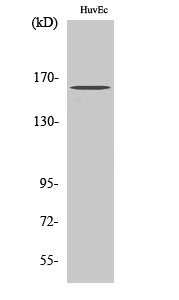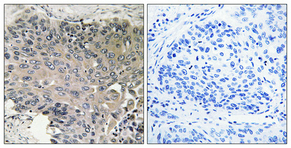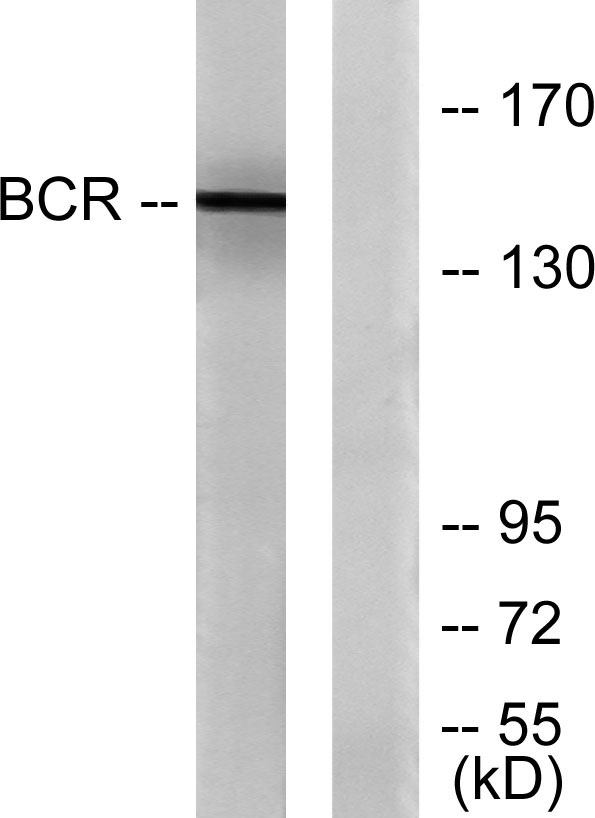Bcr Polyclonal Antibody
- Catalog No.:YT0481
- Applications:WB;IHC;IF;ELISA
- Reactivity:Human;Mouse
- Target:
- Bcr
- Fields:
- >>Pathways in cancer;>>Chronic myeloid leukemia
- Gene Name:
- BCR
- Protein Name:
- Breakpoint cluster region protein
- Human Gene Id:
- 613
- Human Swiss Prot No:
- P11274
- Mouse Gene Id:
- 110279
- Mouse Swiss Prot No:
- Q6PAJ1
- Immunogen:
- The antiserum was produced against synthesized peptide derived from human Bcr. AA range:144-193
- Specificity:
- Bcr Polyclonal Antibody detects endogenous levels of Bcr protein.
- Formulation:
- Liquid in PBS containing 50% glycerol, 0.5% BSA and 0.02% sodium azide.
- Source:
- Polyclonal, Rabbit,IgG
- Dilution:
- WB 1:500 - 1:2000. IHC 1:100 - 1:300. ELISA: 1:20000.. IF 1:50-200
- Purification:
- The antibody was affinity-purified from rabbit antiserum by affinity-chromatography using epitope-specific immunogen.
- Concentration:
- 1 mg/ml
- Storage Stability:
- -15°C to -25°C/1 year(Do not lower than -25°C)
- Other Name:
- BCR;BCR1;D22S11;Breakpoint cluster region protein;Renal carcinoma antigen NY-REN-26
- Observed Band(KD):
- 143kD
- Background:
- A reciprocal translocation between chromosomes 22 and 9 produces the Philadelphia chromosome, which is often found in patients with chronic myelogenous leukemia. The chromosome 22 breakpoint for this translocation is located within the BCR gene. The translocation produces a fusion protein which is encoded by sequence from both BCR and ABL, the gene at the chromosome 9 breakpoint. Although the BCR-ABL fusion protein has been extensively studied, the function of the normal BCR gene product is not clear. The protein has serine/threonine kinase activity and is a GTPase-activating protein for p21rac. Two transcript variants encoding different isoforms have been found for this gene. [provided by RefSeq, Jul 2008],
- Function:
- catalytic activity:ATP + a protein = ADP + a phosphoprotein.,disease:A chromosomal aberration involving BCR is a cause of chronic myeloid leukemia (CML) [MIM:608232]. Translocation t(9;22)(q34;q11) with ABL1. The translocation produces a BCR-ABL found also in acute myeloid leukemia (AML) and acute lymphoblastic leukemia (ALL).,domain:The DH domain is involved in interaction with CCPG1.,domain:The region involved in binding to ABL1 SH2-domain is rich in serine residues and needs to be Ser/Thr phosphorylated prior to SH2 binding. This region is essential for the activation of the ABL1 tyrosine kinase and transforming potential of the chimeric BCR-ABL oncogene.,function:GTPase-activating protein for RAC1 and CDC42. Promotes the exchange of RAC or CDC42-bound GDP by GTP, thereby activating them. Displays serine/threonine kinase activity.,PTM:Autophosphorylated.,similarity:Contains 1 C2 domai
- Subcellular Location:
- Cell junction, synapse, postsynaptic density . Cell projection, dendritic spine . Cell projection, axon . Cell junction, synapse .
- Expression:
- Brain,Epithelium,Platelet,Renal cell carcinoma,T-cell,
- June 19-2018
- WESTERN IMMUNOBLOTTING PROTOCOL
- June 19-2018
- IMMUNOHISTOCHEMISTRY-PARAFFIN PROTOCOL
- June 19-2018
- IMMUNOFLUORESCENCE PROTOCOL
- September 08-2020
- FLOW-CYTOMEYRT-PROTOCOL
- May 20-2022
- Cell-Based ELISA│解您多样本WB检测之困扰
- July 13-2018
- CELL-BASED-ELISA-PROTOCOL-FOR-ACETYL-PROTEIN
- July 13-2018
- CELL-BASED-ELISA-PROTOCOL-FOR-PHOSPHO-PROTEIN
- July 13-2018
- Antibody-FAQs
- Products Images

- Western Blot analysis of various cells using Bcr Polyclonal Antibody

- Immunohistochemical analysis of paraffin-embedded Human lung cancer. Antibody was diluted at 1:100(4° overnight). High-pressure and temperature Tris-EDTA,pH8.0 was used for antigen retrieval. Negetive contrl (right) obtaned from antibody was pre-absorbed by immunogen peptide.

- Western blot analysis of lysates from K562 cells, using Bcr Antibody. The lane on the right is blocked with the synthesized peptide.



